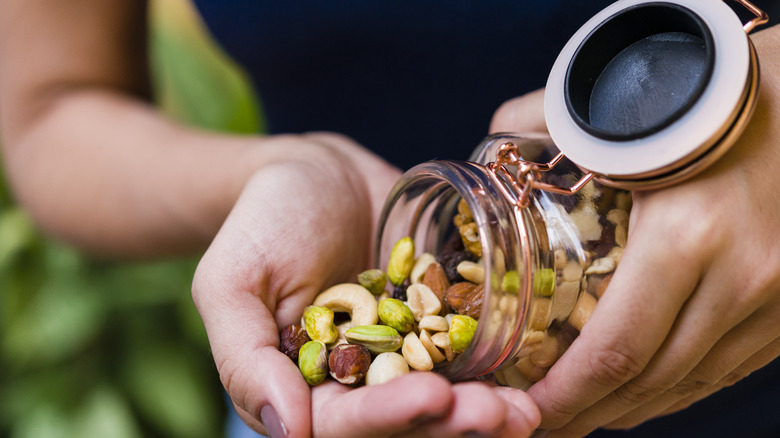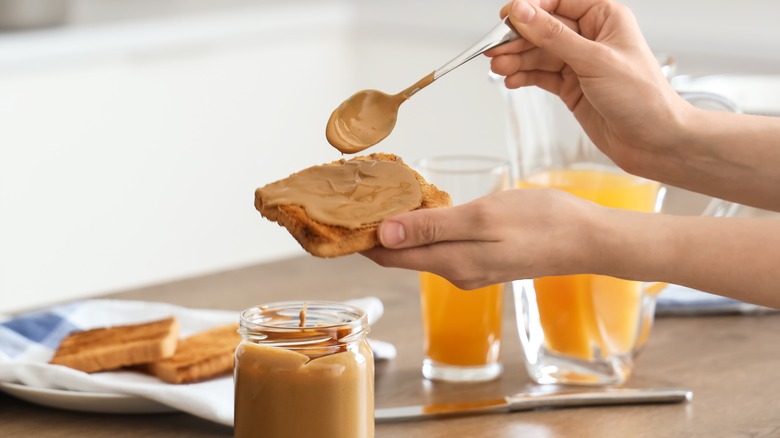Does Eating Peanut Butter Every Day Impact Your Early Death Risk?
A scoop of peanut butter adds a little salty taste to your sweet smoothie and a good amount of protein. Smearing peanut butter on toast can make a good breakfast that will fill you until lunch. Peanut butter on apple slices fights off that late afternoon slump. Peanut butter has a lot of calories, but it's also pretty rich in nutrients. A two-tablespoon serving of peanut butter comes in at 189 calories, but you'll get a healthy dose of magnesium, copper, selenium, niacin, and vitamin B6.
However, more than 70% of peanut butter's calories come from fat. You might think that might shoot your cholesterol levels above a healthy limit, but peanut butter only has 3 grams of saturated fat. Peanut butter is good for you because its unsaturated fats can lower cholesterol and reduce inflammation. With all the healthy nutrition peanut butter has to offer, you might think it can lower your risk of dying early.
Interestingly, research has found that peanut butter isn't associated with your early death risk. With that said, eating peanuts and other types of nuts might help you live a little longer.
Nuts cut your early death risk
A 2015 study in the International Journal of Epidemiology looked at the diets of people aged 55 to 69 living in the Netherlands. Eating up to 5 grams of nuts (a few peanuts or almonds) every day was linked to a 12% lower risk of all-cause mortality. The more nuts you eat, the better. Eating up to 10 grams of nuts like walnuts every day reduces your risk by 26%, and more than 10 grams of nuts (less than an ounce) lowers your risk of early death by 28%. Eating nuts also lowers your risk of dying from neurodegenerative disease and cardiovascular disease by 44% and 17%, respectively. Peanut butter wasn't linked to any risk of death from any disease.
Meanwhile, a 2019 study in Nutrients also found that eating nuts decreases your risk of death, but didn't find a link with peanut butter. The researchers explained that people in their study who ate peanut butter had different lifestyle factors than people who ate nuts. For instance, peanut butter eaters were more likely to eat red meat, smoke cigarettes, and neglect exercise. The researchers also said that processing peanut butter might take away some of the health benefits of nuts. According to the U.S. Department of Agriculture, the thin skin of a peanut has powerful antioxidants similar to green tea.
Peanut butter is still healthy
Eating more peanut butter might be good for your cognitive health, according to a 2021 study in the Journal of Prevention of Alzheimer's Disease. Among more than 2,400 older adults, those who didn't eat peanuts or peanut butter did more poorly on cognitive tests than the people who ate peanuts and peanut butter.
Breakfast is the best time of the day to eat peanut butter because it can slow down your blood sugar, per a 2019 article in the Journal of the American College of Nutrition. Young adults who supplemented their breakfast of apple juice and white bread with two tablespoons of peanut butter had a lower spike in their blood sugars for up to an hour after eating. This effect can also last through lunch. A 2013 study in the British Journal of Nutrition had 15 women with type 2 diabetes and obesity eat either peanuts, peanut butter, or no peanuts at breakfast. When they ate peanut butter, their glucose levels were lower for up to 8 hours after breakfast, even after lunch. They also had lower appetites, and gut satiety hormones such as glucagon-like peptide-1 (GLP-1) were higher.



